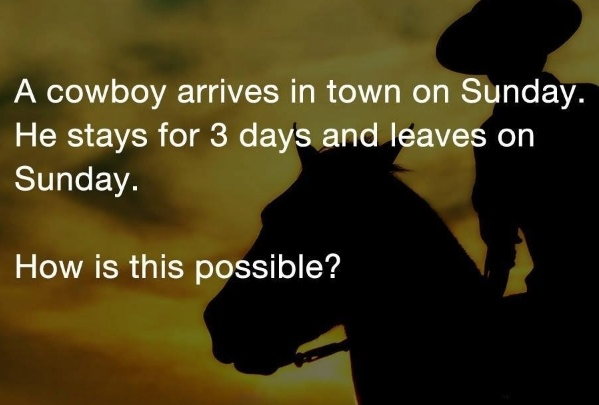
Ready for a Brain-Teaser? Try This Riddle!
Are you up for a riddle that will really get your gears turning? Here’s a fun one to test your logic: A cowboy arrives in town on Sunday. He stays for 3 days and leaves on Sunday. How is this possible? Sounds impossible, right? But that’s the beauty of riddles—they challenge the way we think. Give it a moment; see if you can figure it out before reading on!
When you first hear this riddle, your first thought might be to focus on the idea that Sunday is a day of the week. You might think, “If he arrives on Sunday and stays for 3 days, he must leave on Wednesday, right?” It’s a natural assumption based on a straightforward interpretation of the days.
The trap here is that we are used to thinking of Sunday solely as a day. It’s easy to overlook other meanings or hidden clues. This riddle plays on that automatic assumption, which is why many people initially answer incorrectly.
Let’s break it down step by step to uncover the real solution.
- Breaking Down the Timeline: The riddle states that the cowboy arrives in town on Sunday, stays for 3 days, and then leaves on Sunday. If we only consider the days of the week, this seems impossible. If he arrives on Sunday and stays for 3 days, how can he leave on Sunday again? It doesn’t make sense if Sunday is just a day of the week.
- Thinking Beyond the Obvious: Here’s the twist: the word “Sunday” isn’t just the name of a day—it could also be the name of something else. In this case, Sunday is the name of the cowboy’s horse! Yes, the cowboy arrives on his horse, which is named Sunday.
- The Solution: So, to break it all down:
- The cowboy arrives in town on his horse named Sunday.
- He stays for 3 days.
- He leaves town again, riding his horse Sunday.
This clever twist turns what seems like a time-based riddle into a simple play on words. By focusing too much on Sunday as a day, we miss the real trick behind the riddle.
Riddles often rely on small details that trip us because we interpret them too literally. In this case, the automatic assumption that Sunday refers to the day of the week makes the timeline seem impossible. But once you change your perspective and think creatively, the answer becomes clear.
Riddles like this one teach us an important lesson: sometimes the answer is hidden in plain sight, but we need to change the way we approach the problem to see it.
Now that you know the answer, how did you do? Did you figure it out, or did the name “Sunday” throw you off? We’d love to hear your thoughts! Comment below with your initial answer and whether you cracked the riddle before reading the explanation. Did you consider any other possible answers before realizing the trick?
If you enjoyed solving this riddle, there are plenty more out there to test your logic and critical thinking skills. Riddles are a great way to stretch your brain, improve your problem-solving abilities, and have fun in the process. So, keep challenging yourself with new puzzles and don’t be afraid to think outside the box!
Next time you come across a tricky question, remember this riddle and how shifting your perspective helped you find the answer. Happy puzzling!